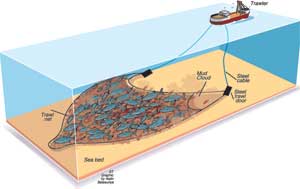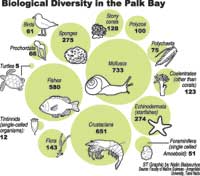| Illicit poaching by Indian fishermen in Sri Lanka’s northern seas has already caused some social and diplomatic ripples, but marine experts point out that it could also become a conservation issue.
Addressing a public forum on Palk Bay Fisheries, Dr.Terney Pradeep Kumara of Ruhuna University’s Department of Oceanography and Marine Geology, claimed, that the Bottom Trawling method of fishing used by Indian fishermen could be harmful to marine habitats on the ocean floor. Bottom trawling is trawling (towing a trawl, which is a fishing net) along the sea floor.
In this method two heavy metal panels are fixed at both sides of the mouth of the Bottom Trawling net to make sure that it remains at the bottom of the sea floor.
The main target area of the Indian fishermen is the Palk Bay which is bounded on the north and west by the coastline of the State of Tamil Nadu and the east by the northeast coastline and the Jaffna peninsula of Sri Lanka.
These metal panels resemble Cow-catchers that are fixed to the front of trains and are meant for the same purpose--to break through anything that blocks its way. Indian fishermen are also poaching in the Gulf of Mannar and the bottom of the ocean of both the Gulf of Mannar and Palk Bay are rich in coral and seaweed. Bottom trawling nets can break these corals and destroy the sea grasses that are attractive marine habitats. “Once destroyed, corals may take years to recover, so it will directly affect our marine biodiversity,” Dr.Terney warned.
This method of fishing is used mainly to catch creatures like prawns and demersal fish like groupers that roam near the water column just above the seabed. Over the years both Sri Lankan and Indian fishermen fished in these areas mainly targeting finfish and chank resources.
But a report published in a journal of the National Aquatic Resources Development Agency (NARA) points out in the 1960s fishing fleets started targeting shrimp resources abundant in these areas due to its high demand. Since then both groups focused more on shrimp resources and found that bottom trawling was preferable to prawn harvesting.
This has resulted in the increase in the number of motor trawlers fishing in the area. This unsustainable fishing practice has fast depleted the fish stocks on the Indian side of the Bay. Therefore the number of Indian fishing vessels crossing the boundary line and entering Sri Lankan waters has also rapidly increased since the 1970s.
Sea Cucumbers and Pearl Oysters are also the targets of Bottom Trawling. Dr.Terney pointed out that the seas around Mannar and Palk Bay are famous for Pearl Oysters and Sri Lanka could lose the economic benefits of this harvest because of the encroaching Indian fishermen. There is high demand for Sea Cucumbers in East Asia where it is a delicacy.
The unsustainable collection has already depleted the Sea Cucumber populations in southern Sri Lanka and if bottom-trawling continues they will fast disappear in the northern seas too. The problem with most of these invertebrates unlike fish that mature fast to lay thousands of eggs, is that they are slow breeders. The problem would be further compounded if this method of fishing continues in shallow waters Dr.Terney said adding that the Indian fishermen are now bold enough to poach as close as 500m away from our shores.
However, the by-catch of Bottom-trawling is what could suffer the most. Endangered marine turtles and other creatures that do not have a commercial value are unavoidable by-catch victims of Bottom Trawling. When the net drags, it also disturbs the underwater sediments and thousands of little creatures that find refuge in the soft sands are exposed to predators.
Recent satellite images that were published in the media showed the extent of the mud and sedimentation trails caused by Bottom Trawling in deep sea. International conservation organizations like GreenPeace are known to place large rocks on strategic locations of the ocean to block Bottom Trawling in high seas in many areas.
“Operating a Bottom-trawling underwater is like running a bulldozer across the Sinharaja Rainforest,” said Nishan Perera –Marine Biologist specializing in fish. The Palk Bay and the Gulf of Mannar record one of the richest Biological Diversity in the Indian Ocean which is 20% of Indian Ocean creatures.
The Palk Bay, located between the Bay of Bengal and the Gulf of Mannar is home to 580 fish species, 733 molluscs, 651 crustaceans and 128 species of stony corals.
Zoologists claim that the Gulf of Mannar is home to over 3,600 species. The five endangered marine turtles also inhabit this area and can get entangled in these nets easily while feeding on the sea grasses at the bottom. The Indian side of the Gulf of Mannar has already been declared as a Man and Biosphere (MAB) Reserve by UNESCO.
Environmental Lawyer Jagath Gunawardene said Bottom Trawling has been banned in Sri Lanka. He said regulations were brought in 1996 November under the Fisheries and Aquatic Resources Act.
Plenty more fish in the sea? Not for much long, says IUCN
Most of us assume that the ocean abounds with fish and is an unlimited natural resource. But a report releasd by IUCN (the International Union of Conservation of Nature) this week, warns that many marine fish could disappear.
According to a study done for the IUCN Red List of Threatened Species on the status of marine fish in the Mediterranean Sea, the IUCN revealed that more than 40 species of marine fish currently found in the region could disappear in the next few years.
|



